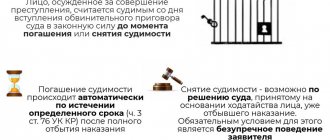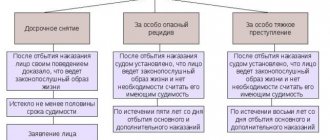The removal of a criminal record through the court is carried out in cases where a person who has already served his sentence wants to be freed from such a specific status before the established period. However, the procedure can only be carried out if a number of conditions are met. If the court meets the applicant halfway and grants the petition, then the legal consequences of the criminal record will be completely annulled. It is true that information that a person has previously served time for a particular crime will, one way or another, be stored in the information database of the Ministry of Internal Affairs. And on an indefinite basis.
The concept of “criminal record”: general information
They talk about a criminal record in cases where a citizen is sentenced to some kind of punishment for committing certain actions that contradict the tenets of the law. According to paragraph 86 of the Criminal Code of the Russian Federation, a person is considered convicted from the moment the relevant authority announces the verdict, or more precisely, from the day the document gains legal force.
Interestingly, a criminal record is not automatically expunged after the period of punishment ends. To completely get rid of this status, you will need to wait more than one year. In this case, the countdown begins precisely from the moment of the official end of the sentence.
At the same time, the presence of an outstanding criminal record entails a number of consequences. First of all, the fact of committing certain illegal actions in the past leaves a rather serious imprint on the entire human life. Most often, society looks at such a citizen with disapproval.
In addition, the factor of an unsealed criminal record is taken into account in case of recidivism, in other words, repeated commission of a crime. And also this point must be taken into account when the next sanctions are imposed for illegal actions. In this case, the preventive measure will be more stringent, and the person will no longer be able to count on an amnesty.
The difference between removing and extinguishing the walker
Removal and expungement of a criminal record - what is the difference? The similarity of meanings is obvious - we are talking about getting rid of restrictions caused by a criminal record. Both options for avoiding consequences are impossible when the penalty is being served. Differences in concepts are established by Art. 84, 85, 86 CC:
- Part one art. 86 - repayment is the automatic end of the period of the criminal record procedure upon termination of the period fixed by law. No special regulations are required in this regard.
- Art. 84 - early withdrawal under amnesty, Art. 85 - in connection with the pardon. Shares are carried out by court decision.
- Part 5 art. 86 takes into account the elimination of a criminal record in order to reward the convicted person for good behavior. If a citizen released from prison has no violations of the regime, the consequences will be removed from him ahead of schedule.
In the latter case, to initiate the process, you need to submit a petition to the court, whereas when expunging a criminal record, the action occurs automatically.
If at the hearing it is revealed that the applicant was brought into custody while a sanction for an offense was in effect, the court will not agree with the early expungement of the criminal record.
Deadlines for expunging a criminal record by law
A criminal record can only be expunged in full on the basis of the provisions of the law.
Moreover, everything depends on the severity of the offense committed. Clause 3 of paragraph 86 of the Criminal Code of the Russian Federation specifies the following deadlines for the official expungement of a criminal record:
- 12 months for citizens who received a more lenient punishment than imprisonment. Here we are talking about correctional work or compulsory activities.
- 3 years after the expiration of the punishment period for persons who have committed acts of moderate or minor severity. This includes punishment of up to 2 years (minor severity) and up to 5 years (moderate severity).
- 8 years, if we are talking about citizens whose crimes are characterized as serious. For example, major thefts, fraud, battery causing serious damage to health.
- 10 years for persons who have committed particularly serious criminal acts. Here we are talking about murder, sale of narcotic substances, causing lethal injuries, etc.
For minors who have committed a crime, the period for expunging a criminal record is reduced. The rule is established by Article 95 of the Criminal Code.
In this case, the person will not be considered convicted after the following period:
- 6 months after completion of the imposed sentence, if we are not talking about actual imprisonment;
- 12 months, for persons who have committed criminal acts of minor or medium severity;
- 3 years after completion of the punishment established for committing a crime, the category of which is characterized as grave or extremely grave.
But when we are talking about a suspended sentence, in other words, when a person is not deprived of freedom, but certain sanctions are applied to him, here the criminal record is expunged at the end of the probationary period.
Is it possible to have a criminal record expunged early?
A criminal record, one way or another, entails a number of certain negative consequences. For example, many structures refuse to hire people who have previously served a sentence. In a sense, such a past leaves an imprint on a person’s entire life, even if he has long since repented.
Therefore, in some cases, it is possible to remove a criminal record after serving a sentence early through the court. It’s true that you can’t just carry out the procedure like that. It will be necessary to prove that the person is worthy of having his status revoked earlier than expected.
The applicant will need to meet the following requirements:
- do not violate the norms of public order, do not get involved;
- conduct a successful work activity;
- repent of committing a crime;
- fully compensate for the damage caused to the victim (if this was stipulated by the verdict);
- do not miss the date of appearance at the Penitentiary Inspectorate (Criminal Execution Inspectorate).
When considering the issue, the court will take into account all the characteristics of the behavior of the former convict. If a citizen has not been involved in dubious matters, behaved impeccably, and regularly complied with the requirements of the law, then the court will grant the petition and the criminal record will be expunged ahead of schedule.
Step-by-step algorithm of actions
To have a criminal record annulled early, a person will need to file a petition with the court. Moreover, jurisdiction depends on the severity of the crime. Expungement of convictions for minor offenses is considered by magistrates. But if the request is submitted by a person who has committed theft, robbery, and even more so murder, you should contact the district court at your place of residence.
The general algorithm of the applicant’s actions will be as follows:
- prepare a petition;
- collect documents;
- submit the papers to the judicial authorities.
After receiving the documents, a hearing is scheduled, where, on the basis of Article 400 of the Code of Criminal Procedure, in addition to an oral explanation from the previously convicted person, other interested parties, as well as the prosecutor, if present, can be heard. Be sure to study all the provided characteristics. After which the decision made is announced.
If the court satisfies the request with an appropriate ruling, the document is forwarded to the Criminal Investigation Department and the criminal record is canceled before the due date. In this case, the person is no longer obliged to mention such a fact in his biography, because officially he is not considered to have been prosecuted.
Consequences
If a citizen has a criminal record, he faces problems in several areas:
| Labor activity | Social sphere | Criminal legal sphere |
A citizen is prohibited:
| A citizen does not have the right:
|
|
If there is a criminal record, a citizen is required to indicate this fact when filling out a number of official documents in various authorities (usually such documents contain a column indicating the presence of a criminal record).
Read about the conditions for revoking a suspended sentence and expunging a criminal record here.
Documentary base
The package of papers, first of all, includes a petition to expunge a criminal record. The form has a standard form and is filled out directly by the submitter. Here you should definitely indicate the grounds for early liquidation of the status and the rationale for your position along with specific arguments.
The following is attached to the application:
- passport;
- a copy of the verdict;
- certificate of execution or completion of the sentence;
- all kinds of characteristics - from the local police officer, from the place of work, from relatives, from neighbors, from the place of study;
- payment documents indicating the fact of compensation for damage caused to victims;
- copies of a marriage certificate, birth of a child, as a factor proving the conduct of a respectable family life;
- an extract indicating the availability of a place of permanent residence.
Also, the package of documents can be supplemented with other papers indicating the impeccable behavior of the former convict. These may be reviews from public organizations where the person is a member. Or, for example, official thanks.
Deadline for going to court
Of course, filing a petition with the court immediately after serving or executing a sentence will not work. Some time must pass so that subsequently the highest authority can be convinced that the person is no longer inclined to commit offenses.
There are no clear deadlines here, but by default the following framework is used:
- half of the probationary period established by the judicial authority for suspended prisoners;
- six months from the expiration of a sentence not related to actual imprisonment;
- 1.5 years, if the period of imprisonment is 5 years, but not more;
- 4 years for cases where the term is from 5 to 10 years;
- minimum 5 years if the person has served a sentence of more than 10 years.
However, despite the fact that in this case the timing plays a fairly large role, first of all, the fact of correction and repentance must be proven. A criminal record will be cleared ahead of schedule only when the court is convinced of this and there is no doubt left in it that the citizen has realized his mistakes and does not intend to return to his former life.
If the application is rejected, the person can apply again with a similar request. But you can make another attempt only after 12 months.
Who practically tried and what happened.
In judicial practice there are a lot of cases that ended in the refusal of the applicant to satisfy his demands.
Example 1. Case No. 2-1406/2011. Citizen Yagodkina I.I. appealed to the court with a request to remove information regarding her from the database. In her statement, she indicated that the prosecution for the act she committed was terminated, although she never received the prosecutor's order. The court, having studied the case materials, came to the conclusion that it was impossible to remove information from the GIAC, since the parties did not deny the fact of committing a crime. The court explained that termination of proceedings on non-exonerating grounds is not a reason to destroy data from the system.
Example 2. Case No. 2-4962/2013. Citizen Miller N.V. appealed to the court with a demand to remove information about him from the GIAC of the Russian Federation because he considers the storage of information discrediting him illegal. From the case materials it is obvious that the applicant was convicted, served his sentence, and had his conviction expunged. The court refused to satisfy the applicant's demands, indicating in the decision that the information entered the database legally, so its exclusion was not provided for.
Other examples can be given.
Next, we will consider the court decisions taken in favor of the applicants.
Example 1. Case No. 2-7330/2011 ~ M-7113/2011. Semenov N.P. It was possible to prove that information about the crime he allegedly committed got into the database by accident; a criminal case was never opened against him. Since the materials had already been destroyed, and the police confirmed the fact that no case had been opened, the court ordered the authorized body to delete information about N.P. Semenov. from GIAC RF.
Example 2. Case No. 2-604/2011 ~ M-267/2011. Shamsutdinov N.R. won the argument because he proved that he knew nothing about the fact that an investigation was being carried out against him. Since the case materials were destroyed and cannot be restored, the court decided to satisfy the requirements to remove information from the GIAC of the Russian Federation.
Example 3. Case No. 33-2621/2011. Sheremetyev V.M. committed a crime that ended in the reconciliation of the parties in a private prosecution case. The applicant asked the court to remove information about the crime from the database, since the proceedings ended on exonerating grounds. The court satisfied the demands of V.M. Sheremetyev. Information about him was indeed subject to removal from the database.
Thus, it will only be possible to remove information from the RF GIAC database if it is located there illegally.









